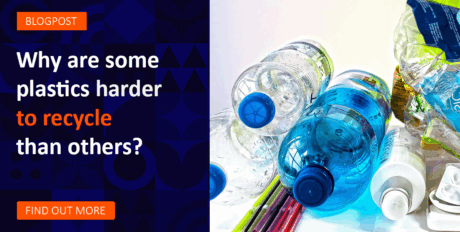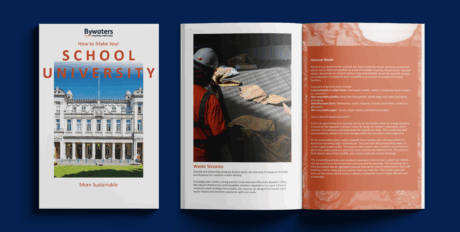Contact us today for your Free Quote
At Bywaters, we champion zero-landfill solutions and advocate for moving waste up the waste hierarchy. Many businesses in the hospitality, event, facility, and property sectors generate glass waste daily and have the potential to significantly improve their glass recycling and reuse practices. Let’s address these challenges and explore actionable steps towards a more sustainable future.
What is glass?
Glass, an amorphous material known as the “fourth state of matter”, with its extraordinary properties, glass has the atomic structure of a supercooled liquid but the mechanical properties of a solid. This makes glass one of the most versatile and ubiquitous materials that can be shaped and formed into multiple things that we use in our daily lives, from glass bottles to fibre optics used to transmit light over long distances.
Glass and sustainability
Glass is a sustainable material, made from sand, limestone, and soda ash. It is indefinitely recyclable and can be reused without losing its quality. Unfortunately, due to its resilient and ancient nature, glass does not decompose easily and can take up to 4000 years to break down. This leads to a significant issue of glass waste in landfills. In the UK, an astonishing 14 million units are discarded in landfills each day, amounting to over 5 billion units annually, perpetually unable to decompose, with 1 kilo of glass in landfill producing 1.4 kilo of Co2, that is why glass recycling is essential to our planet.
What should businesses do with their glass waste?
Before disposing of glass waste, think about reduction and reuse. Ask yourself if you really need things with glass and look for ways to cut down on your purchases. This simple shift in buying habits can make a significant difference to the environment. For items you already own, get creative! Reuse your glass containers for new purposes, like turning jam jars into storage for other items, such as pen holders. By prioritising reduction and reuse, we can minimise waste and conserve valuable resources from our planet.
Rather than throwing your glass waste in the general waste bin, ensure it goes in the designated Dry mixed recycling or Glass recycling stream. Bywater’s can help you acquire the correct containers, facilitating the return of your glass into the circular economy.
How does Bywater’s help you recycle glass?
Once scheduled for collection, your glass waste will be transported to Bywaters’ state-of-the-art, solar-powered Material Recycling Facility (MRF). This facility helps our clients and customers reduce their Scope 2 and 3 emissions by minimising the use of fossil fuels during the recycling process.
Inside the MRF the glass is crushed into mullet, removing any dirt or debris and sorted by colour, quality and size using advanced optical scanners and screens then its bulked and transported to reprocessors.
At the reprocessors glass is smelted in a furnace at very high temperatures of around 1500°C and then shaped into a mould to where it is turned into a new products.
Tech solutions for boosting glass recycling
If you generate a lot of glass waste in your business, glass crushers can help prevent your bins from overflowing with empty containers. These crushers break down glass into smaller pieces called cullet, which significantly reduces their volume. This makes them easier to dispose of and requires fewer bins and collections, making your waste management cheaper.
What are the benefits of glass recycling?
Glass recycling is not only good for the environment, but also good for business. The manufacturing process requires significantly less energy when using recycled glass (cullet) compared to virgin raw materials like sand, limestone, and soda ash. This translates to cost savings as well. Since glass is 100% recyclable, this environmental and economic benefit is continuous. Estimates suggest this process can save up to 30% of the energy needed for production, which directly reduces greenhouse gases. Furthermore, by utilising our solar-powered Material Recycling Facility (MRF), Scope 2 and 3 emissions are reduced even further.
Ready to give your glass waste a second life? Contact us today to learn about our glass recycling service.
More posts:
Valentine’s Day: History, Tradition, and Its Modern Impact
This post traces the evolution of Valentine’s Day from ancient Roman rituals to a global commercial event. It highlights the holiday’s hidden environmental impact and offers a guide to celebrating sustainably through “Circular Romance” and waste reduction.
Read morePlastic Recycling: Why Are Some Types Harder to Process Than Others?
Some plastics recycle easily, while others are difficult or impractical to process at scale. This article explains why material type, packaging design, contamination and recycling infrastructure all play a role, and what businesses can do to improve plastic recycling outcomes in the UK.
Read moreThe Ultimate Guide For a Sustainable School and University
Download The Ultimate Guide For a Sustainable School or University. Get the roadmap to cut costs, reduce your carbon footprint, and boost your ESG profile with 5 core pillars.
Read more




